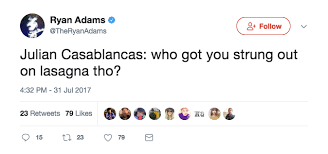‘Meet Me In The Bathroom’ Spills All Of Indie-Rock’s Dirtiest Secrets
*sips tea*

This year saw the release of Lizzy Goodman’s Meet Me In The Bathroom, an oral history of one of music’s most exciting eras: the New York indie rock scene of the 2000s. AMELIA MARSHALL explains why it’s one book you should really find time for in 2017.
In the early 2000s the internet still had the air of the underground. These were the days of dial up, the discordant noise that marked your entry into another realm. Back then, pre-Facebook, we used screen names, because using your actual name seemed risky.
At the time New York was experiencing a musical renaissance, with The Strokes leading the charge, followed by Yeah Yeah Yeahs, Interpol, LCD Soundsystem, and dozens of imitators. But the internet took the local movement global: Napster hadn’t yet been shut down, and CDRs of The Strokes’ first EP made their way into stereos around the world.
“There’s alcohol, there’s drugs, infighting and love affairs. If it’s titillation you’re after, you’ll find it”
Lizzy Goodman’s Meet Me In The Bathroom is an oral history of New York’s music scene from 2001 to 2011. Weighing in at over 600 pages and featuring 200 interviews, the book has big names offering their version of the revival of rock ‘n’ roll, but another recurring character controls it all: the internet.
The book is juicy. Goodman elicits all kinds of confessions and accusations from her subjects: Julian Casablancas accuses Ryan Adams of getting Strokes bandmate Albert Hammond Jr. into heroin; they all recount an intervention where Adams was told to stay away. James Murphy confesses he only discovered dance music after trying ecstasy. Pete Doherty of The Libertines may or may not have propositioned Stroke Nick Valensi.
There’s alcohol, there’s drugs, infighting and love affairs. If it’s titillation you’re after, you’ll find it.
But there is also insight into the cultural forces that created The Strokes and every other band that was on your iPod Nano in 2006. For music nerds and outcasts, the internet allowed you to connect with your kind. You no longer had to rely on the radio to discover new music; forums and torrent services would allow you to find the best pickings, without having to drop your pocket money on an album. Music fans who might have stayed safely in one genre were now free to explore.
In one anecdote in the book, Ezra Koenig of Vampire Weekend tells how he was an intern for The Walkmen before he started his band. It’s a story that neatly demonstrates a generational divide, from guitar-based indie to the genre agnostic bands of today, that pick and choose sounds from a broad range of influences.
Of course, the same streaming and downloading services that allowed kids in their bedrooms to listen to Kate Bush and Television and Nigerian disco and Soviet New Wave caused the downfall of the music industry. The Strokes and their contemporaries were the last wave of bands who could ride the wave of big label cash.
For those who came of age during the heyday of The Strokes and the New York rock ‘n roll revival, Meet Me In The Bathroom achieves a feat of recreating the sense of excitement that infiltrated music culture at the time. Goodman shows strength as an interviewer, with the likes of Karen O, Jack White, Paul Banks demonstrating honesty and vulnerability.
That candidness has caused some shockwaves, with Ryan Adams firing shots at The Strokes after its release in a series of tweets in which he fat-shamed Julian Casablancas:

While they’re now thought of as an early 2000s throwback, the influence of the Strokes stretches on, from fashion (skinny jeans and leather jackets) to all the kids who were inspired to buy a guitar and start bands of their own.
Certainly one thing about them seems dated, and that’s the idea of indie rock as a genre. It had stopped being a business model long before, when bands like Sonic Youth went major label.
But the idea of “genre” as a whole is becoming less relevant with every ‘new’ genre invented, from chillwave to tropical house to dubstep. Genre has become gentrified, just as the idea of early 2000s Brooklyn has been borrowed by bars and clothing brands from Melbourne to Madrid.
Meet Me In The Bathroom takes us back to the Brooklyn that was, the one we have been trying to recreate ever since.
—
Amelia Marshall is the Editor of The Cusp. She is on Twitter.